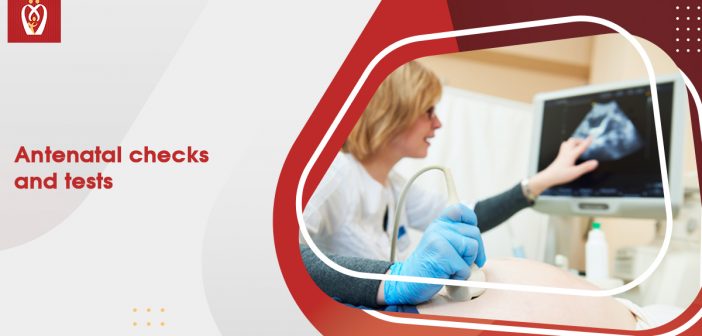When you are 6-8 weeks pregnant, you will have your first antenatal care (also known as prenatal) appointment with a GP or midwife. It is crucial to see a GP early in pregnancy to schedule checks and tests. Checks and tests are provided, but you will be given time to think and research information. However, you are not required to take any tests if you do not wish to. (antenatal care)
Most general practitioners refer patients to a local pathology lab for urine and blood tests. The antenatal test results may take a few days to reach the GP. Some of these checks and tests may be repeated during routine checks during antenatal care to monitor for any health issues as you approach childbirth. You can book an appointment with your doctor or midwife using the Nurturey pregnancy app.
About Nurturey
If you need NHS information about antenatal checks and tests, Nurturey PinkBook is the way to go. The PinkBook from Nurturey is a “digital substitute” for the NHS’s Red Book. Pregnant women and parents can use the PinkBook to access their child’s health records, view upcoming health checkups, and get trusted information about their stage in the parenting or pregnancy journey from the NHS. If you are pregnant and have concerns, use the Nurturey pregnancy app to immediately make an appointment with your doctor or midwife. You can also schedule appointments, refill prescriptions, and communicate with your physician.
Let’s start with the list of 10 antenatal checks and tests typically provided at the first visit.
Detailed health history
Your first antenatal care appointment may last 20-30 minutes so that your general practitioner can clearly understand your health and any issues that may affect your pregnancy. Your GP may question you regarding:
- Your current or previous medical conditions and medications
- Your parent’s medical history, such as diabetes and high blood pressure
- Smoking and alcohol consumption habits
- Pregnancies and births in the past
- Workplace, especially if it is a stressful environment
- The GP may also ask your partner about his medical history and lifestyle habits.
It will help the GP/midwife determine any health risks that may arise during your pregnancy and any health risks to your baby. (antenatal care)
Weight |
Your GP may measure your height and weight to calculate your body mass index (BMI). It will serve as a baseline for your pregnancy, and your GP will advise you on a healthy weight gain range for you and your baby. Most pregnant women will gain weight in the second or third trimester.
During pregnancy, it is impossible to avoid gaining weight. However, when you start breastfeeding, the extra weight usually falls off. (antenatal care)
Blood Pressure | antenatal care


Your GP will take a blood pressure reading on routine checks carried out during antenatal care. In the first and second trimesters, blood pressure is usually low. It then rises during the third trimester.
During pregnancy, high blood pressure is a common health problem. If not taken care of, it can become a serious condition known as pre-eclampsia. High blood pressure can be dangerous to both you and your baby. But it can be safely managed during pregnancy, especially if detected early.
You have high blood pressure if your blood pressure is higher than 140/90.
Full blood examination (FBE)
This antenatal care test will assess your health and screen for anemia, infections, and other diseases.
Anemia happens when your body does not have enough healthy red blood cells. Thus, it reduces the oxygen carried around your body and your baby.
Ferritin
This antenatal care blood test determines your iron levels. Ferritin levels indicate how much iron the body stores. Low ferritin levels in your blood confirm iron deficiency, which is common during pregnancy, particularly in the third trimester.
Thyroid-stimulating hormone (TSH)
This antenatal care blood test will look for thyroid disorders. The thyroid is a gland in the front of the neck that produces hormones that regulate many bodily functions, including metabolism and weight. During the first trimester, thyroid hormones are crucial for your baby’s brain and nervous system development.
Urine MCS | antenatal care
This antenatal care urine test will look for bacterial infections (such as a urinary tract infection) or kidney disease. In addition, the urine test will detect protein, sugar, or blood.
Even if you have no symptoms, it is important to screen for urine infections because there is an increased risk of developing a kidney infection later in pregnancy. (antenatal care)
If a bacterial infection is discovered, antibiotics can be used to treat it safely.
Blood group and antibody screen
This antenatal care blood test will determine your blood type (A, B, AB, or O) and your Rh factor (positive or negative). This test may not be necessary if you already know your blood type.
Incompatibility issues can arise when an Rh-negative pregnant woman gives birth to an Rh-positive baby. Therefore, you will be given an anti-D antibody injection during pregnancy or childbirth if you have a negative Rh factor to avoid complications if your baby is Rh-positive. (antenatal care)
Vitamin D | antenatal care
This antenatal care blood test will determine your vitamin D levels. Vitamin D is crucial for bone health. Unfortunately, vitamin D deficiency (low vitamin D levels) is quite common in the UK. According to one survey, approximately one in every five adults and one in every five children suffer from vitamin D deficiency in the UK. Because of less exposure to sunlight in the winter and spring, more people have low vitamin D levels.
Your GP will recommend a daily vitamin D supplement if it’s low. You can purchase a vitamin D supplement without a prescription from a pharmacy.
Infections
Serology tests determine whether you are infected with hepatitis B, hepatitis C, HIV, or syphilis. Sometimes people with these infections show no symptoms, and the conditions go undetected. In addition, these infections can be passed from mother to baby, known as mother-to-baby transmission.
Antibody tests are antenatal care blood tests used to determine your immunity to certain vaccine-preventable infections, such as rubella and varicella-zoster (chickenpox). Having rubella or chickenpox during pregnancy can cause complications and congenital disabilities.







